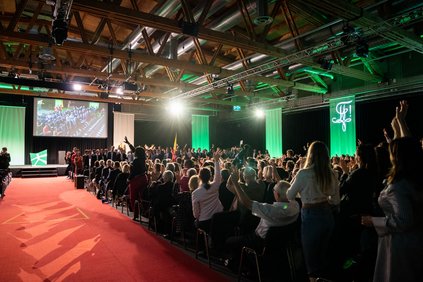Campus - 17.09.2020 - 00:00
Cross-generational exchange – the HSG mentoring programme
What's the best way for me to prepare for a job interview? What can I do to work on my presentation skills? Or how can I find the right balance in my everyday university life? During their degree course, students are faced with many new challenges. To be able to successfully meet these challenges, it can be advantageous to seek out a helping hand. This is precisely where the mentoring programme comes to the aid of students, offering them support from experienced people. By student reporter Anna Kati Schreiter.

16 September 2020. Once the semester break is over, the summer is gradually nearing its end, and the St.Gallen Rosenberg is starting to come alive again, it's time for a new Autumn semester to start at HSG. With this start to a new chapter in their academic careers, the students are confronted with new impressions and exciting discoveries, as well as challenges, which may bring their own high and lows. At the same time, the multitude of opportunities and the pressure to perform are ever present these days. Also because this topic is ubiquitous and because, as we all know, hindsight is a wonderful thing, the university would like to offer students support from experienced people with its mentoring programme.
More than 18 years of exchange between mentees and mentors
The HSG mentoring programme has been bringing mentors and mentees together for the past 18 years to promote exchange between Bachelor’s, Master’s and postgraduate degree students and people from the world of work. The primary aim of the programme is to provide mentees with professional and personal development, whereby the aims and specializations of the two-year mentoring programme will be agreed individually between each duo. As a collaboration between the HSG and HSG Alumni, more than 500 mentors have been found for the programme, of which more than 80% are alumni of the University of St.Gallen. Since demand in recent years has significantly increased, and outstrips supply, some mentors even support several mentees during their degree courses.
We are proud that we are able to offers students at HSG this kind of support opportunity and that our mentors offer their time on a voluntary basis to accompany students on their very personal journey.
Carolin König, Head of the Mentoring Programme
2020 mentoring programme
Students have time to apply for the mentoring programme in the first two lecture weeks of the Autumn semester and to make an initial choice of mentor. After the application period, the mentoring duos are assigned by the HSG mentoring team. This involves matching on an individual basis, using matching software, in order to fulfil the mutual expectations of both mentee and mentor as much as possible. The official mentoring relationship begins in November with the mandatory kick-off event at the HSG. Just how the future collaboration of the duo is to evolve will be determined in an initial one-to-one meeting or in a written mentoring agreement. The only obligation of the mentee is a report each semester to the mentor and programme management. This report is expected to form the basis for a subsequent semester meeting. As additional support, the programme management puts on voluntary workshops which aim to help mentees, as well as mentors, to form a successful mentoring relationship.
Dealing with current challenges
Carolin König finds it fascinating "how differently the various mentoring relationships are working." Young Bachelor’s students tend to ask questions, for example, about how they can find an interesting placement, or how best to prepare for an interview. Master’s students, on the other hand, tend to seek out support for career entry issues after their upcoming graduation.
The mentoring relationship can help the mentee to overcome current challenges – these could include compiling their CV, ideas for the Bachelor's dissertation or Master's thesis, support for developing their presentation skills, or a simulated interview as practice. In so doing, the mentors pass on their valuable individual experiences to the younger generation to support them on their personal journey.
The interesting mentoring discussions have opened up new perspectives and views for me, both with regard to everyday life at university and planning my future career. For example, I was able to shadow my mentor at work for a whole week, giving me an insight into the practical work of a lawyer.
Sarah Olsen, law student and mentee of the mentoring programme
Mentors take on social responsibility
The fact that some duos continue the relationship in a private setting on a voluntary basis after the two years is testament to the programme providing more than just a benefit to the students. Mentors come into direct contact with ambitious, young people who are motivated to shape the future. In so doing they can expand their networks with new talent, as well as with other mentors, at workshops or annual meet-ups. They also take on a social responsibility, perhaps even coming up against their own personal challenges.
I benefit most when I see that my mentee is developing well and feels comfortable in their own skin. [...] I gain pleasure from supporting budding students and, in return, it is definitely a plus to keep my eyes and ears open and let young people have their say.
Dr. Gabriele Weiher, mentor in the HSG mentoring programme
According to Carolin König, it's not uncommon for former mentees to put themselves forward as mentors because they want to give something back to the uni and the programme. This ensures that valuable experience does not get lost, but is passed on to the younger generation.
Anna Kati Schreiter is a fifth semester business administration student at the University of St.Gallen.
Image: Mentoring programme
More articles from the same category
Discover our special topics











